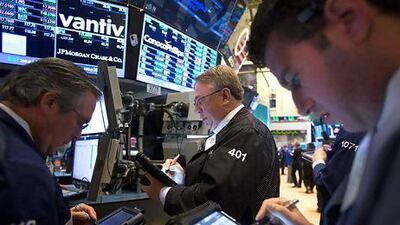Another nail in the coffin of the "cult of equities" was hammered home a couple of days ago with news that, for the first time in the decades long history of the multitrillion dollar hedge fund industry, investors would be holding more of their assets in fixed interest products rather than ordinary stock.
That development follows similar signals from several big western investors that they were increasingly falling out of love with ordinary stocks and shares, and turning to bonds as a means to iron out volatility.
That makes sense for investing institutions such as pension funds and life insurance companies, which have legal duties to ensure pensioners and policyholders get paid out.
Fixed interest instruments, they increasingly believe, provide more long-term stability than equities.
But the "hedgies" are supposed to be the swashbuckling adventurers of the investment world. If they too are now put off by the risk and volatility of equity investment, maybe it really is time to call the "death of equities".
But, stable and secure though sovereign or big corporate bonds might appear, an overdependence on bonds produces its own worries.
Investors looking at the Arabian Gulf region, and potential issuers there looking to finance ambitious development plans over the next few years, should be aware of the risks before they consign the equity to its grave.
In recent research JPMorgan estimates some US$2 trillion (Dh7.35tn) has flowed into fixed income funds in the past, compared with equity allocation of about $400 billion.
Equity funds - the mechanism by which investors get into quoted stocks and shares - have suffered net outflows over the past two years.
The reason is not difficult to see. Since the 2008 financial crisis, the S&P 500 index, probably the best bellwether for the western-dominated global stock market, has slowly and painfully climbed back to around pre-crisis levels. But there has been a lot of painful value-destruction along the way.
Bond markets, on the other hand, even with the continuing crisis of the euro zone, have been delivering positive if uninspiring yields all that time. The average yield on United States corporate debt has fallen from nearly 6 per cent in 2007 to about 2.8 per cent today. So bonds versus equities looks a no-brainer for investors seeking to preserve values in turbulent times.
Those figures take no account of inflation, however, so in some western markets, such as the US, Germany and the United Kingdom, real yields are hovering just on the positive side. That is the first danger of the current pumped-up bond market: it runs the real risk of being eaten away completely if inflation increases even marginally.
The other danger is that the new demand for bonds results in investors throwing money at low-yielding assets in their quest for security. There has been lots of disturbing talk recently of a "bond bubble" along the lines of the dotcom boom of a decade ago, or the subprime crunch that sparked the global crisis in 2008.
Middle East policymakers have shown a new enthusiasm for fixed interest investments over the past two years. Yields in the region have remained relatively high. Especially in the GCC area, increased government spending has led governments and government-related-companies to look to the bond markets to fill gaps in public expenditure.
Much of the new government spending comes from energy revenues, of course, but treasuries and central banks in the region are being won over, to some extent, by the argument that it is better to keep high-priced energy resources in the ground and finance growth in other ways.
And some, of course, do not have that much energy revenue any more, such as Dubai, Bahrain and Oman.
There will be significant demands on budgets throughout the region.
Dubai's most recent announcements of a series of mega-projects, in particular, is still being costed, but policymakers must have earmarked the bond markets to cover a substantial chunk, if not most of that expenditure.
With equities out of favour, and many western banks still feeling the pinch from the crisis, fixed interest is one of the few refuges. But they carry their own risks.

